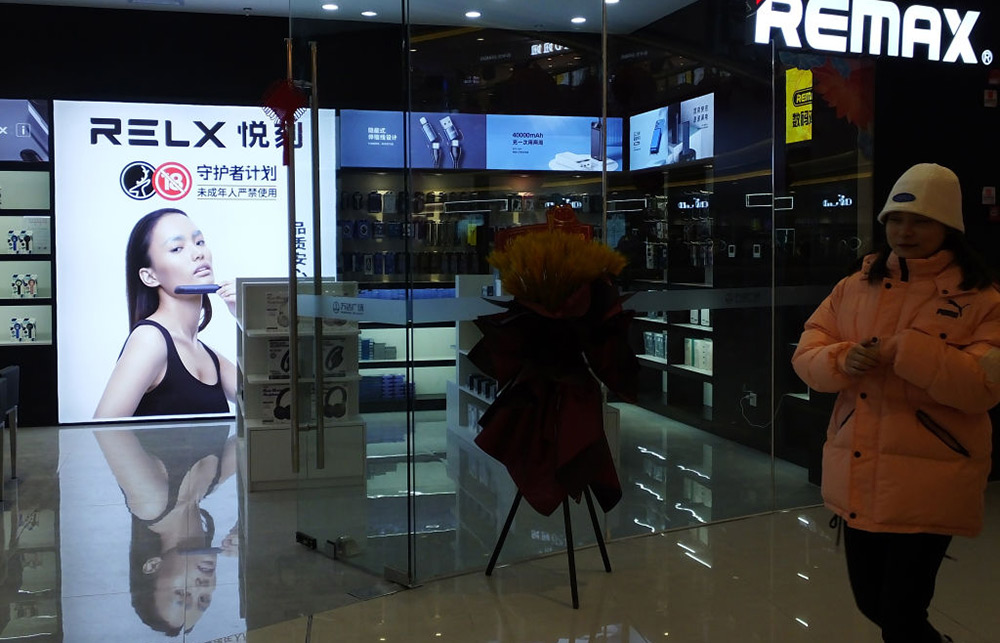
悦刻及其背后的母公司雾芯科技(Relx Technologies)作为中国最大的电子烟制造商,显得有些太年轻了,年轻得还没够到可以抽烟的年纪。成立不到三年,就在中国发展得风生水起。中国是全球最大的卷烟市场,有大约3.1亿烟民,销售额达2100亿美元。
尽管这是一家非常年轻的公司,悦刻还是于1月22日赴纽约证券交易所(New York Stock Exchange)公开上市,并进行了一场规模达14亿美元的IPO。投资者迅速将悦刻的股价推高了近100%,使这家电子烟公司的市值膨胀至350亿美元。
总部位于香港的金融管理集团银行大和资本(Daiwa Capital Markets)的董事黎家禧(Carlton Lai)说:“悦刻IPO的成功一点也不令人惊讶。”“悦刻是第一个在美上市的大型独立电子烟品牌,在中国拥有100%的曝光率,而中国仍然是电子烟渗透率非常低且快速增长的市场。”
该公司的数据显示,悦刻控制着中国电子烟市场60%的份额,在2020年前9个月的销售额为3.24亿美元。该公司还预测,到2023年,中国整个电子烟行业的收入将从2019年的15亿美元激增至113亿美元。
但是,由于政府还未能敲定应该将电子烟归于烟草行业还是技术行业,不仅是悦刻,整个中国电子烟业市场的发展都面临着监管环境不确定性的威胁。
电子烟
世界上的第一支电子烟是由一位名为韩力的药剂师在2003年于中国发明的,当时,他正在努力地尝试戒烟。但是,电子烟在其诞生国的销售却很缓慢。根据中国灼识咨询公司的数据,中国的电子烟在成年烟民中的渗透率约为1.2%,而美国则是32%。然而,自2016年以来,中国的电子烟渗透率增长了三成——该机构估计的增长率是0.4个百分点。
随着电子烟在中国愈发流行,国家开始为这一行业制定新的规范。2018年,国家市场监管总局和中国烟草(中国卷烟的国资企业)规定,购买电子烟的合法年龄定为18岁,与烟草相同。以前,电子烟的销售没有年龄限制。随后,中国政府于2019年全面禁止了电子烟在线上的销售活动和广告宣传——政府正在逐步采取措施,规范这一市场。
和美国食品与药品监督管理局(Food and Drug Administration)于2016年出台规定、将电子烟厂商视为烟草公司加以监管不同,中国的监管机构已经不再对电子烟行业发布整体的规定,而是将其视为另一种商业消费类技术产业。
“在全球的主要市场中,中国是唯一没有明确电子烟监管框架的国家。因此,我们认为,政府在如何监管该行业方面,仍然存在很多不确定性。”黎家禧说。
美国电子烟生产商Juul就在2019年经历过这种不确定的监管环境。那时,就在Juul上线中国几大电商网站后的几天,中国就禁止了电子烟的在线销售。Juul被迫仓皇撤出中国市场,悦刻也突然断了线上的收入来源——这笔收入先前占其销售额的26%。
尽管法规发生了变化,但与前一年同期相比,悦刻的销售额在2020年的前9个月增长了176%。该公司拒绝对本文发表评论,因为它正处于IPO后的“安静期”。但去年1月,悦刻承诺,将投资7700万美元,于2023年之前在全球开设1万家门店。
根据该公司的招股说明书,悦刻在中国已经拥有5,000家“品牌合作伙伴门店”,其产品还能够在其他10万家零售商处购买。
咳嗽者
悦刻的快速扩张战略很容易理解——斥资数百万美元将门店遍布中国——是科技类创业公司的典型做法。悦刻的创始人及首席执行官汪莹是Uber中国和本土打车应用滴滴出行的前高管,滴滴于2016年收购了Uber中国。
悦刻创始人的技术背景或许可以解释中国政府将电子烟归于消费技术类的政策。但是,一些地方级行政单位已经修改了各市的相关法规,以处理类似于传统卷烟的电子烟。例如,深圳市于2019年对电子烟实行了等同于烟草的监管政策,要求电子烟零售商也要展示“吸烟有害健康”的警告标志。
香港中文大学教授刘锋说:“很难说把电子烟归于哪一类。”他表示,政府想要阻止电子烟在年轻人中蔚然成风,但是又不愿意完全压榨这个行业,因为这会引起消费者的强烈反对。
但是,由国家控股的中国烟草的子公司已经开发了自己的电子烟生产线,并且如果它能够占领市场,也会决定加入这场竞争。市场研究公司欧睿(Euromonitor)的数据显示,这家国有巨头占了中国卷烟销售量的97%。(财富中文网)
编译:陈聪聪
悦刻及其背后的母公司雾芯科技(Relx Technologies)作为中国最大的电子烟制造商,显得有些太年轻了,年轻得还没够到可以抽烟的年纪。成立不到三年,就在中国发展得风生水起。中国是全球最大的卷烟市场,有大约3.1亿烟民,销售额达2100亿美元。
尽管这是一家非常年轻的公司,悦刻还是于1月22日赴纽约证券交易所(New York Stock Exchange)公开上市,并进行了一场规模达14亿美元的IPO。投资者迅速将悦刻的股价推高了近100%,使这家电子烟公司的市值膨胀至350亿美元。
总部位于香港的金融管理集团银行大和资本(Daiwa Capital Markets)的董事黎家禧(Carlton Lai)说:“悦刻IPO的成功一点也不令人惊讶。”“悦刻是第一个在美上市的大型独立电子烟品牌,在中国拥有100%的曝光率,而中国仍然是电子烟渗透率非常低且快速增长的市场。”
该公司的数据显示,悦刻控制着中国电子烟市场60%的份额,在2020年前9个月的销售额为3.24亿美元。该公司还预测,到2023年,中国整个电子烟行业的收入将从2019年的15亿美元激增至113亿美元。
但是,由于政府还未能敲定应该将电子烟归于烟草行业还是技术行业,不仅是悦刻,整个中国电子烟业市场的发展都面临着监管环境不确定性的威胁。
电子烟
世界上的第一支电子烟是由一位名为韩力的药剂师在2003年于中国发明的,当时,他正在努力地尝试戒烟。但是,电子烟在其诞生国的销售却很缓慢。根据中国灼识咨询公司的数据,中国的电子烟在成年烟民中的渗透率约为1.2%,而美国则是32%。然而,自2016年以来,中国的电子烟渗透率增长了三成——该机构估计的增长率是0.4个百分点。
随着电子烟在中国愈发流行,国家开始为这一行业制定新的规范。2018年,国家市场监管总局和中国烟草(中国卷烟的国资企业)规定,购买电子烟的合法年龄定为18岁,与烟草相同。以前,电子烟的销售没有年龄限制。随后,中国政府于2019年全面禁止了电子烟在线上的销售活动和广告宣传——政府正在逐步采取措施,规范这一市场。
和美国食品与药品监督管理局(Food and Drug Administration)于2016年出台规定、将电子烟厂商视为烟草公司加以监管不同,中国的监管机构已经不再对电子烟行业发布整体的规定,而是将其视为另一种商业消费类技术产业。
“在全球的主要市场中,中国是唯一没有明确电子烟监管框架的国家。因此,我们认为,政府在如何监管该行业方面,仍然存在很多不确定性。”黎家禧说。
美国电子烟生产商Juul就在2019年经历过这种不确定的监管环境。那时,就在Juul上线中国几大电商网站后的几天,中国就禁止了电子烟的在线销售。Juul被迫仓皇撤出中国市场,悦刻也突然断了线上的收入来源——这笔收入先前占其销售额的26%。
尽管法规发生了变化,但与前一年同期相比,悦刻的销售额在2020年的前9个月增长了176%。该公司拒绝对本文发表评论,因为它正处于IPO后的“安静期”。但去年1月,悦刻承诺,将投资7700万美元,于2023年之前在全球开设1万家门店。
根据该公司的招股说明书,悦刻在中国已经拥有5,000家“品牌合作伙伴门店”,其产品还能够在其他10万家零售商处购买。
咳嗽者
悦刻的快速扩张战略很容易理解——斥资数百万美元将门店遍布中国——是科技类创业公司的典型做法。悦刻的创始人及首席执行官汪莹是Uber中国和本土打车应用滴滴出行的前高管,滴滴于2016年收购了Uber中国。
悦刻创始人的技术背景或许可以解释中国政府将电子烟归于消费技术类的政策。但是,一些地方级行政单位已经修改了各市的相关法规,以处理类似于传统卷烟的电子烟。例如,深圳市于2019年对电子烟实行了等同于烟草的监管政策,要求电子烟零售商也要展示“吸烟有害健康”的警告标志。
香港中文大学教授刘锋说:“很难说把电子烟归于哪一类。”他表示,政府想要阻止电子烟在年轻人中蔚然成风,但是又不愿意完全压榨这个行业,因为这会引起消费者的强烈反对。
但是,由国家控股的中国烟草的子公司已经开发了自己的电子烟生产线,并且如果它能够占领市场,也会决定加入这场竞争。市场研究公司欧睿(Euromonitor)的数据显示,这家国有巨头占了中国卷烟销售量的97%。(财富中文网)
编译:陈聪聪
Relx Technologies, China's largest e-cigarette maker, is far too young to smoke. Founded just under three years ago, the young vape maker has flourished in China—the world’s largest cigarette market with around 310 million smokers and $210 billion in sales.
Despite its youth, Relx went public on January 22, launching a $1.4 billion IPO on the New York Stock Exchange. Investors quickly puffed Relx's share price up nearly 100%, inflating the e-cigarette firm's market cap to $35 billion.
“The success of Relx’s IPO was not a surprise at all,” says Carlton Lai, director of Hong Kong-based financial management group bank Daiwa Capital Markets. “Relx is the first major standalone vape brand to go public in the U.S., and it has 100% exposure to China, which is still a market with very low penetration and rapidly growing.”
According to the company’s own data, Relx controls 60% of China’s vape market with sales of $324 million in the first nine months of 2020 and it predicts industry-wide revenue in China will surge from $1.5 billion in 2019 to $11.3 billion in 2023.
But Relx’s growth—and the growth of China’s vape scene in general—is threatened by a hazy regulatory environment due to Beijing's inability to decide whether to classify e-cigarettes as tobacco or tech.
Vapor trail
The world’s first e-cigarette was invented in China, by a pharmacist named Hon Lik, who was trying to quit smoking in 2003. But the electronic product was slow to take off in its country of origin. According to China Insights Consultancy (CIC), penetration of e-cigarettes in China is at roughly 1.2% of the adult smoker population, compared to 32% in the U.S. Nevertheless, the penetration rate in China has increased threefold since 2016, when CIC estimates it was at 0.4%.
As vaping became more popular in China, Beijing moved to regulate the emerging practice. In 2018, the State Administration for Market Regulation and China Tobacco—the state-owned monopoly on cigarette production in China—set the legal age for buying e-cigarettes at 18, the same as tobacco. Previously there had been no age limit on vape sales. Beijing then banned the online sale and advertising of e-cigarettes completely in 2019, as the government continued its piecemeal approach to regulating the market.
Unlike in the U.S., where the Food and Drug Administration (FDA) decided to regulate e-cigarette makers as tobacco companies in 2016, Beijing’s regulators have stopped short of issuing comprehensive rules for the vape industry and have instead treated it as just another consumer tech business.
“China is the only major market globally that does not have a clear regulatory framework on e-cigarettes. As such, we believe there’s still a lot of uncertainty over how the government would regulate the industry,” Lai says.
U.S.-based vape maker Juul was the victim of that uncertainty in 2019, when China banned the online sale of vapes days after Juul launched on China’s leading e-commerce sites. Juul was forced into a hasty retreat from China, while Relx suddenly lost its online revenue stream, which had previously accounted for 26% of its sales.
Despite the shifting regulation, Relx’s sales grew 176% in the first nine months of 2020 compared to the same period a year earlier. The company declined to comment on this article, since it is in a post-IPO “quiet period,” but last January Relx committed $77 million to open 10,000 stores worldwide by 2023.
According to the company's prospectus, Relx already has 5,000 "brand partner stores" in China—a relationship the company says "may be deemed to be franchisees" under China law—and its products are available at 100,000 other retailers.
Coughers
Relx’s rapid growth strategy—investing millions to establish a presence across China—is a classic move in the tech start-up playbook. No wonder: Relx’s founder and CEO, Kate Wang, is a former executive at Uber China and Didi Chuxing, the local ride-hailing app that bought out Uber China in 2016.
The tech background of Relx’s founders might give credence to Beijing’s policy of treating vaping as consumer tech. Some local jurisdictions, however, have already amended municipal laws to treat e-cigarettes akin to traditional cigarettes. Shenzhen brought e-cigs under the tobacco umbrella in 2019, for instance, requiring vape shops to display signs warning that smoking is bad for your health.
“It’s difficult to say where the central government will land on e-cigarettes,” says Liu Feng, a professor at Chinese University of Hong Kong who focuses on the economics of vice habits. According to Feng, authorities are keen to discourage vaping as a trend among young people, but they're reluctant to endure a consumer backlash by squashing the industry entirely.
However, subsidiaries of state monopoly China Tobacco have developed their own own e-cigarette line and could dominate the market if it decides to enter the fray. The state-owned giant accounts for 97% of China's cigarette sales, according to market researcher Euromonitor.






